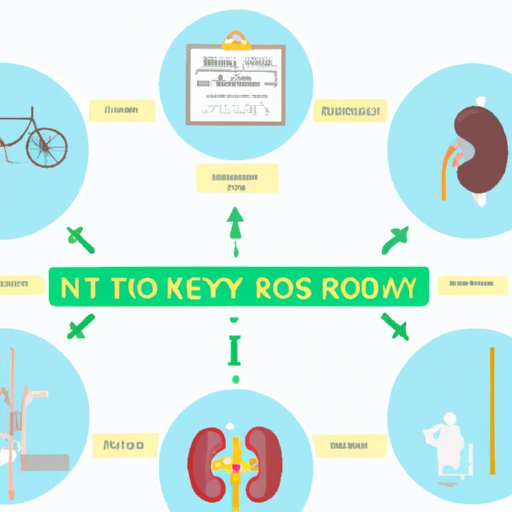Introduction
Kidney surgery is a major medical procedure that involves removing a portion of the kidney or an entire organ. It’s a serious operation that requires careful post-operative care and monitoring. One of the most common questions people have after undergoing kidney surgery is when they can safely resume driving. This article will explore the physical requirements for driving after kidney surgery, explain how long it takes to heal, review guidelines for when you can resume driving, examine factors that impact the ability to drive, outline tips for safe driving, describe the risks of driving too soon, and explore alternatives to driving.

Discussing the Physical Requirements for Driving After Kidney Surgery
The first step in determining when you can drive after kidney surgery is to assess your physical ability to operate a vehicle safely. You should not get behind the wheel if you are feeling weak, dizzy, confused, or fatigued, as these can all increase the risk of a car accident. Additionally, you should make sure that you are able to move your legs and feet freely so that you can reach the pedals and brake in an emergency situation.
It’s also important to consider the impact of any medication you may be taking following your surgery. Certain medications can cause drowsiness, confusion, or impaired coordination, all of which can make driving unsafe. Talk to your doctor about any potential side effects of your medications before getting behind the wheel.

Explaining How Long it Takes to Heal After Kidney Surgery
The amount of time it takes to heal after kidney surgery depends on the type of operation performed and the overall health of the patient. Generally speaking, most people take at least four weeks to recover from kidney surgery. During this time, it’s important to follow your doctor’s post-operative care instructions, including taking medications as prescribed and abstaining from strenuous activities. Additionally, you should avoid sitting for extended periods of time and get plenty of rest.
Reviewing Guidelines for When You Can Resume Driving After Kidney Surgery
Medical professionals generally advise waiting at least four weeks before resuming driving after kidney surgery. However, there may be exceptions depending on the type of operation performed and the individual’s physical capabilities. Your doctor can provide specific guidance about when it is safe for you to start driving again. Additionally, many insurance companies require that you wait at least four weeks before driving after a major surgery like kidney surgery.
Examining Factors that Impact Driving After Kidney Surgery
Before getting back behind the wheel, it’s important to evaluate your physical capabilities and the potential side effects of any medications you’re taking. As previously mentioned, you should not drive if you are feeling weak, dizzy, or confused. Additionally, certain medications can cause drowsiness or impair coordination, making it unsafe to drive. Make sure that you speak with your doctor about any potential side effects before deciding whether or not to drive.
Outlining Tips for Safe Driving After Kidney Surgery
If your doctor has given you the go-ahead to resume driving after kidney surgery, there are a few things you can do to ensure your safety. First, take frequent breaks while driving. If you start to feel tired, pull over and take a break. Additionally, try to avoid distractions while driving, such as eating, talking on the phone, or adjusting the radio. Finally, make sure that you are well hydrated and alert before getting behind the wheel.

Describing the Risks of Driving Too Soon After Kidney Surgery
Driving too soon after kidney surgery can be extremely dangerous. Not only can you put yourself at risk of a car accident, but you could also face legal consequences if you are found to be driving while impaired by medication. Additionally, driving too soon after a major surgery can delay the healing process, resulting in prolonged pain and discomfort.

Exploring Alternatives to Driving After Kidney Surgery
If you are not comfortable driving after kidney surgery, there are a few alternatives available. Public transportation is a great option for those who don’t want to drive. Additionally, ride-sharing services like Uber and Lyft can provide a safe and convenient way to get around without having to drive yourself. Finally, friends and family members may be willing to provide rides if needed.
Conclusion
Kidney surgery is a major medical procedure that requires careful post-operative care and monitoring. The amount of time it takes to heal after kidney surgery varies based on the individual’s health and the type of operation performed. Most doctors advise waiting at least four weeks before resuming driving after kidney surgery. However, it’s important to assess your physical capabilities and the potential side effects of any medications before getting behind the wheel. If you are not comfortable driving after kidney surgery, there are several alternatives available, including public transportation and ride-sharing services. For more information, contact your doctor or local transportation authority.
(Note: Is this article not meeting your expectations? Do you have knowledge or insights to share? Unlock new opportunities and expand your reach by joining our authors team. Click Registration to join us and share your expertise with our readers.)
